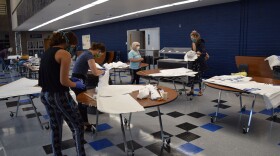The Navajo Nation has ordered all people on its vast reservation to wear protective face masks when out in public to help fight the spread of the new Coronavirus.
As of Saturday, 1,197 residents of the reservation have tested positive for COVID-19. Navajo health officials say the average age of the more than 40 people who have died from coronavirus on the reservation is 66.
The Navajo Nation has been hit harder by the coronavirus than any other Native American tribe. Tribal resident Jonathan Nez says officials will consider even more aggressive requirements to reduce the spread.
Meanwhile, Navajo Nation President Jonathan Nez and Vice President Myron Lizer have vetoed a resolution that sought to cancel the tribal council’s session less than three days before the scheduled start.
The Navajo Nation Council is required to hold four regular sessions each year in the months of January, April, July and October. The spring session is scheduled to begin Monday morning.
Although the resolution passed by the council cites concerns over the possible spread of coronavirus among Navajo Nation employees and officials, Nez and Lizer said the Council and its committees have continued to hold regular and special meetings throughout the pandemic. They say with proper protective equipment for staff and the use of teleconferencing, the session can proceed as scheduled.
In other developments, the federal government is giving the Navajo Nation temporary authority to use unassigned airwaves to provide wireless broadband service.
The Federal Communications Commission on Friday granted the requested authority for 60 days to help the tribe’s emergency response to the coronavirus outbreak.
The commission says the authority should help the tribe as reservation residents work from home and increasingly rely on telemedicine and remote learning.
Many residents in remote areas without broadband service sit in vehicles parked near local government centers, fast-food restaurants and grocery stores to connect to Wi-Fi.







